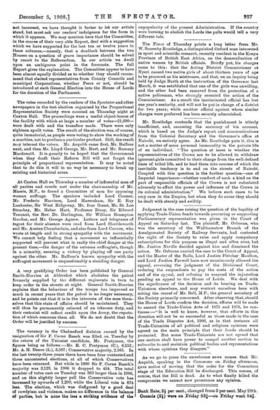Judgment in the case raising the question of the legality
of applying Trade-Union funds towards procuring or supporting Parliamentary representation was given in the Court of Appeal on Saturday last. The plaintiff, Mr. Osborne, who was the secretary of the Walthamstow Branch of the Amalgamated Society of Railway Servants, had contested the right of the Society to raise and apply compulsory subscriptions for this purpose as illegal and ultra trires, but Mr. Justice Neville decided against him and dismissed the action. Mr. Osborne carried the case to the Court of Appeal, and the Master of the Rolls, Lord Justice Fletcher Moulton, and Lord Justice Farwell have now unanimously allowed the appeal, reversing the judgment of the Divisional Court, ordering the respondents to pay the costs of the action and of the appeal, and refusing to suspend the inj unction pending an appeal to the House of Lords. We deal with the significance of the decision and its bearing on Trade- Unionism elsewhere, and may content ourselves here with noting the caveat of Mr. Bell, M.P., the general secretary of the Society primarily concerned. After observing that, should the House of Lords confirm the decision, efforts will be made to amend the Trade-Union Acts of 1871 and 1876, be con- tinues :—" It is well to know, however, that efforts in this direction will not be so successful as those made in the case of the Trade Disputes Act, 1906, as in that instance all Trade-Unionists of all political and religious opinions were agreed on the main principle that their funds should be protected. But some Trade-Unionists are not agreed that one section shall have power to compel another section to subscribe to and maintain political bodies and representatives with whose opinions they disagree."






































































 Previous page
Previous page